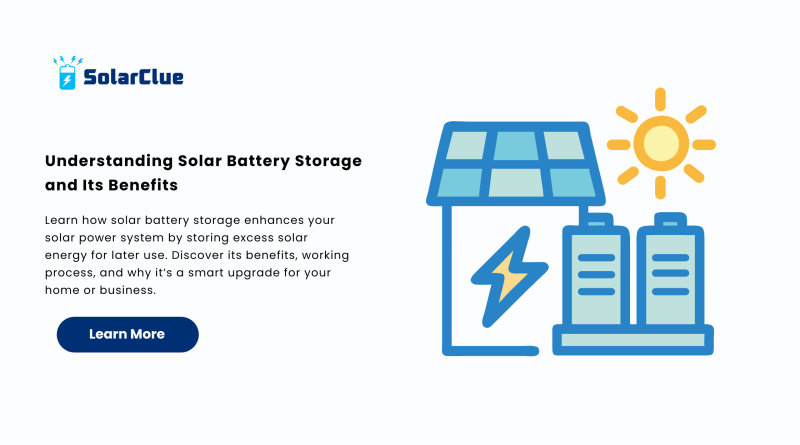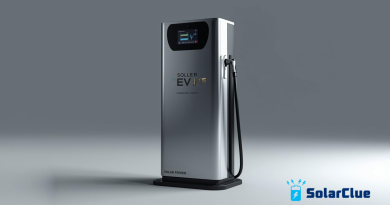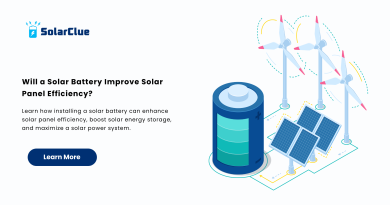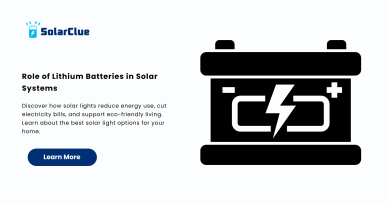Understanding Solar Battery Storage and Its Benefits
As more homeowners and businesses turn to solar energy for a sustainable future, a crucial component is becoming increasingly popular — solar battery storage. While solar panels generate electricity during daylight hours, what happens when the sun goes down or during power outages? That’s where solar battery storage comes into play. In this blog, we’ll explore what it is, how it works, and why it’s an essential part of a complete solar power system.
Table of Contents
- 1 What is Solar Battery Storage?
- 2 How Solar Battery Storage Works
- 3 Types of Solar Batteries
- 4 Key Benefits of Solar Battery Storage
- 5 Is Solar Battery Storage Right for You?
- 6 Factors to Consider Before Buying Solar Battery Storage
- 7 Installation and Maintenance Tips
- 8 What’s the Future of Solar Battery Storage?
- 9 FAQs
- 10 Conclusion:
What is Solar Battery Storage?
Solar battery storage allows you to store excess electricity produced by your solar panels during the day and use it later when the sun isn’t shining. This technology helps reduce reliance on the grid, lowers electricity bills, and provides backup power during outages.
Instead of wasting unused solar energy, the battery captures it for later use — giving you more control over your power consumption and ensuring none of your green energy goes to waste.
How Solar Battery Storage Works
A typical solar power system generates electricity when sunlight hits the solar panels, converting it into DC (Direct Current) electricity. This DC electricity is then sent to an inverter, which converts it into AC (Alternating Current) electricity — the type used by most household appliances.
When the solar energy generated exceeds your home’s immediate usage, the surplus can either be:
-
Sent back to the grid (if you have net metering), or
-
Stored in a solar battery for future use.
When your panels aren’t producing electricity — like at night or during cloudy days — the system automatically draws power from the battery instead of the grid.
Types of Solar Batteries
There are several types of solar battery storage solutions available:
1. Lithium-Ion Batteries
-
Most commonly used due to their efficiency, lightweight design, and long lifespan.
-
Ideal for residential and commercial use.
2. Lead-Acid Batteries
-
Cheaper upfront cost but bulkier and have a shorter lifespan.
-
Often used in off-grid systems.
3. Flow Batteries
-
Suitable for large-scale storage and commercial installations.
-
Known for long cycle life and deeper discharge capacity.
Choosing the right battery depends on your energy needs, budget, and desired backup duration.
Key Benefits of Solar Battery Storage
Integrating solar battery storage into your solar power system offers multiple advantages:
1. Energy Independence
You become less reliant on the grid and are protected from rising electricity costs and grid outages.
2. Backup During Power Outages
One of the most compelling solar battery storage benefits is having power during blackouts. Whether it’s during a storm or a grid failure, your lights stay on.
3. Maximize Solar Usage
Without a battery, excess energy goes to the grid. With storage, you utilize 100% of your solar energy, making your investment more valuable.
4. Reduce Electricity Bills
Using stored energy during peak hours when electricity rates are highest helps reduce your monthly bills significantly.
5. Environmentally Friendly
Storing and using more solar energy helps reduce reliance on fossil fuels, contributing to a greener planet.
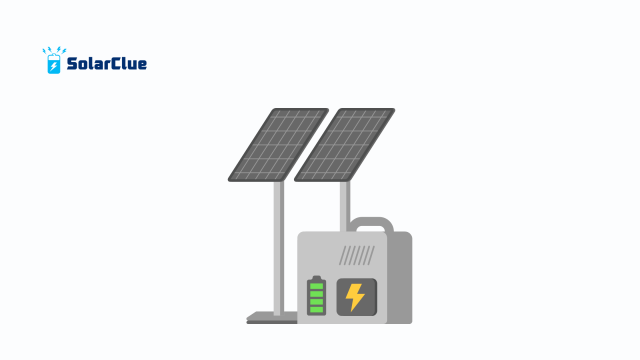
Is Solar Battery Storage Right for You?
Adding solar battery storage makes the most sense if:
-
You experience frequent power cuts.
-
You want to maximize your use of clean energy.
-
You’re located in an area without net metering.
-
You want to take full control of your energy usage.
For many homeowners and businesses in India, it’s a smart move. As solar panel prices drop and solar battery storage technology improves, the return on investment gets stronger every year.
Factors to Consider Before Buying Solar Battery Storage
1. Battery Capacity
Measured in kilowatt-hours (kWh), it determines how much energy your battery can store.
2. Depth of Discharge (DoD)
Indicates how much of the battery’s energy can be used. Higher DoD means better usability.
3. Efficiency
Refers to how much energy you get out of the battery compared to what you put in. Look for round-trip efficiencies of 90% or more.
4. Warranty and Lifespan
Most high-quality batteries come with 10-15 years of warranty. It’s a long-term investment, so choose wisely.
Installation and Maintenance Tips
-
Always hire certified professionals to install your solar battery storage.
-
Ensure your solar panel system is compatible with battery storage.
-
Regular maintenance is minimal but necessary — keep it clean, monitor performance, and update software when needed.
What’s the Future of Solar Battery Storage?
With the rise in solar power system adoption and increasing government support in India, solar battery storage is poised to become a standard part of home and commercial energy setups. As technology becomes more affordable and efficient, the transition to completely self-reliant solar energy systems will only accelerate.
FAQs
Q1. Can I add a solar battery to my existing solar panel system?
Yes, most modern systems are compatible with battery add-ons. Just ensure you consult with a professional to check compatibility and wiring requirements.
Q2. How long does a solar battery last?
Depending on the type, most solar battery storage solutions last between 10–15 years with proper care.
Q3. Are solar batteries worth the investment?
If you face frequent power outages or lack net metering, solar battery storage can provide significant savings and energy security over time.
Q4. Do solar batteries work on rainy or cloudy days?
Yes, stored solar energy can be used even when the sun isn’t shining, making your system reliable during all weather conditions.
Conclusion:
If you’re serious about taking full control of your energy consumption, reducing electricity bills, and ensuring uninterrupted power — solar battery storage is the way forward. It not only complements your solar panel setup but also empowers you to use clean solar energy when you need it most. To explore personalized solutions, expert recommendations, and top solar power system components, visit solarclue.com or check out our latest insights at blog.solarclue.com — we’re here to brighten your solar journey.

